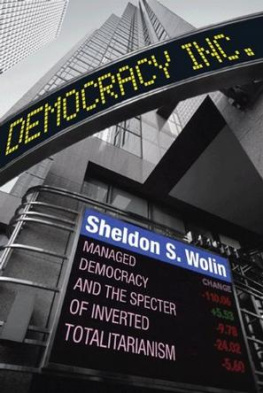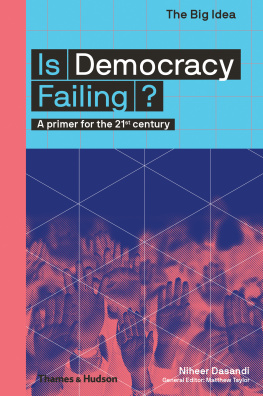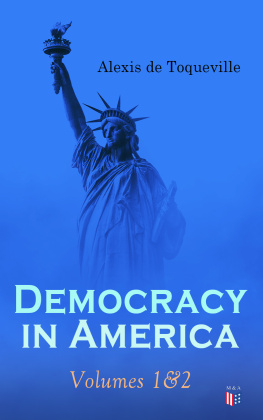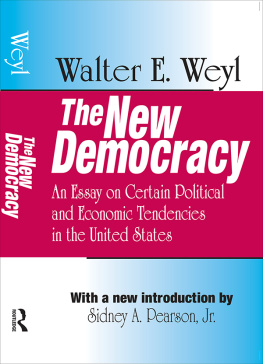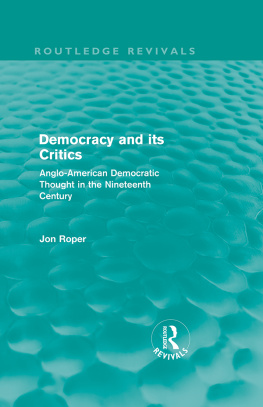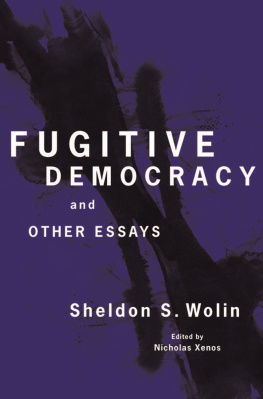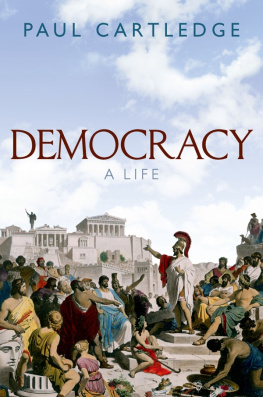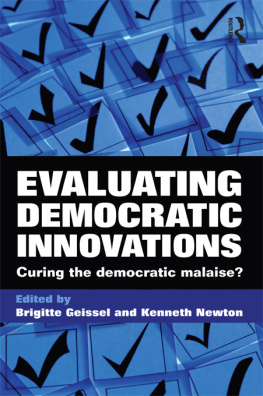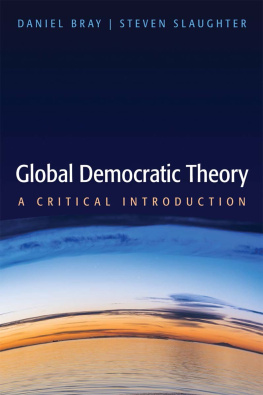Democracy Incorporated
Democracy Incorporated
Managed Democracy and
the Specter of Inverted Totalitarianism
WITH A NEW PREFACE BY THE AUTHOR
S HELDON S. W OLIN

Copyright 2008 by Princeton University Press
Published by Princeton University Press, 41 William Street,
Princeton, New Jersey 08540
In the United Kingdom: Princeton University Press, 6 Oxford Street,
Woodstock, Oxfordshire OX20 1TW
All Rights Reserved
Fifth printing, and first paperback printing, 2010
Paperback ISBN: 978-0-691-14589-1
The Library of Congress has cataloged the cloth edition of this book as follows
Wolin, Sheldon S.
Democracy incorporated : managed democracy and the specter of inverted totalitarianism / Sheldon S. Wolin.
p. cm.
Includes bibliographical references and index.
ISBN 978-0-691-13566-3 (hardcover : alk. paper)
1. DemocracyUnited States. 2. Corporate stateUnited States.
3. United StatesPolitics and government. 4. Political scienceHistory.
5. Political sciencePhilosophyHistory. 6. Totalitarianism. 7. Fascism. I. Title.
JK1726.W66 2008
320.973dc22 2007039176
British Library Cataloging-in-Publication Data is available
This book is composed in Electra
Printed on acid-free paper.
press.princeton.edu
Printed in the United States of America
5 7 9 10 8 6
To Carl and Elizabeth Schorske
Contents
Totalitarianisms Inversion:
Beginnings of the Imaginary of a Permanent Global War
The Utopian Theory of Superpower:
The Official Version
The Politics of Superpower:
Managed Democracy
Inverted Totalitarianism:
Antecedents and Precedents
Democracys Prospects:
Looking Backwards
Preface to the Paperback Edition
SPARE CHANGE
Democracy Incorporated describes certain tendencies in American politics and argues that they are serving to consolidate a unique political system of inverted totalitarianism. Rather than attempting a summary of the volume, I want to examine a contemporary political development that, it could be argued, invalidates or undermines my thesis. I am referring both to the unprecedented election in 2008 of an African American as president and to the widely held expectation that the Obama administration would proceed promptly to undo the excesses of the Bush regime, many of which I had used as evidence in support of the thesis of Democracy Incorporated.
In adopting change as the signature theme of his presidential campaign, Obama chose an idea as American as the proverbial apple pie. Ever since the nations beginnings, Americans have seen themselves as futurists, notable for their receptiveness, even their addiction, to change and to its counterfeit, novelty. Typically, change was considered to be virtually synonymous with progress, with the promise of steady material improvement in the lives of most citizens as well as a better future for their children. Change thus tended to be identified with expanded opportunity rather than with a fundamental shift such as that represented by Jacksonian democracy, when power relationships among groups and classes were significantly altered. Another example of fundamental change was the abolition of slavery, although arguably the political promise of the Fourteenth and Fifteenth amendments was not realized until the presidential election of 2008.
Throughout much of American history, government has been an active promoter of fundamental change. The Civil War amendments were aimed at undoing past wrongs associated with the institution of slavery. New Deal programs significantly improved the lives of ordinary people, especially the poor, and marked a change in direction, away from free-market capitalism and toward a mixed economy notable for significant governmental initiatives and interference in the economy.
Thus we have two distinct conceptions of change, each involving active governmental intervention. One we can call mitigative or tactical change. It seeks to redress a situation or condition without significantly modifying power relationships (e.g., a tax break for the middle class). The other, paradigmatic or strategic change, institutes not only a new program but recasts basic power relationships: it reforms, empowers, sets a new direction (e.g., a single-payer health care system). Democracy Incorporated describes the paradigmatic change represented by the amalgamation of state and corporate power.
Sometimes a paradigmatic change takes the form of an attack on an entrenched or longstanding status quofor example, reducing the power of the antebellum plantation owners. Sometimes a mitigative change might seek to undo a previous paradigmatic change in order to restore, to a limited extent, the status quo ante. For example, the repressive paradigm shift initiated after September 11, 2001, that included governmental wire tapping, surveillance, and denial of due process, might be undone by restoring prior practices more respectful of due process and First Amendment rights.
Paradoxically, Obamas victory might turn out to be a reaction, a yearning for a certain status quo ante that would rescind some of the changes introduced by the Bush-Cheney administration, such as torture of detainees. If so, then the change promised by the 2008 election may be more mitigative than paradigmatic, aiming to restore or modify rather than opting for a sharply different direction.
In the mid-twentieth century, starting with the Cold War and its anticommunist crusade at home and abroad, and attaining its consolidation in the Reagan counterrevolution, the national fixation on change, while it retained a strong economic and technological driving force, was joined to a new and self-conscious conservatism. The result was a unique dynamic: change that professed to look backward to some distant city on a hill. It was not regressive in the sense of actually restoring the past. Rather the new conservatism appealed to an idealized, mythical past as a strategy in its culture war against liberalism. It combined political, religious, and cultural elements into an ideology that appealed to Founding Fathers, the original constitution, biblical texts, family values, the sanctity of traditional marriage, and a militant patriotism. (America, Love It or Leave It.) Its economic ideology also looked to an imagined past, to a free economy where harmony and prosperity had resulted from enlightened selfishness and small government.
Conservative politics, however, was far from being merely nostalgic. In deliberately promoting inegalitarianism it qualified as paradigmatic. The celebration of the unchanging provided ideological cover for the basic aim of reversing or modifying as much as possible the changes previously introduced by egalitarian social programs. By reducing or eliminating programs that had helped to empower the Many, inegalitarianism reinforced a structure which combined state and corporate power. Although the administration of George W. Bush would continue and even intensify the attacks on liberal social programs and the liberal culture of permissiveness, it substituted a new paradigm that would refocus the dynamics which anticommunism had first generated. It would push outward in an aggressive quest for imperial hegemony, an emphasis different from the somewhat more provincially minded Reagan conservatives. The new paradigm would display a unique feature, one virtually unknown to previous versions of national identity. It would define the scope of its dominion by postulating an enemyterrorismthat had no obvious limits, neither temporal nor spatial, nor a single fixed form. Thus the new paradigm introduced a monumental change that redefined national identity, overshadowing republic and democracy. The United States, hitherto a name that denoted the lower half of a continent, now signified a global empire.
Next page
